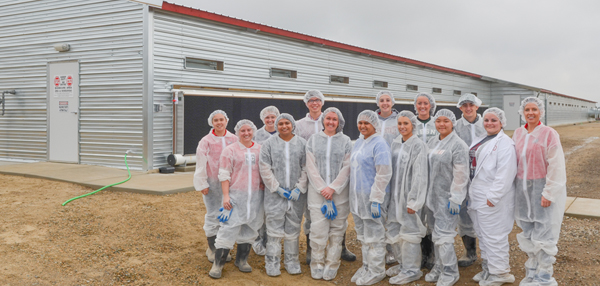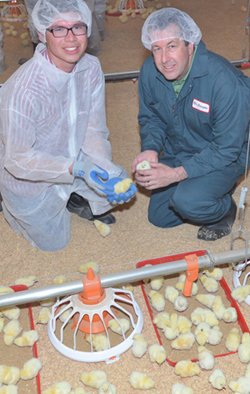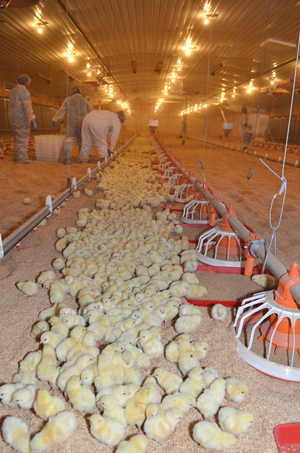California Agricultural Technology Institute

New Fresno State poultry production unit offers education, research opportunities for students
The new Foster Farms Education and Research Facility on the Fresno State campus has so far raised about 80,000 broiler chickens in the seven months it has been operating.
The facility features state-of-the-art technology and management techniques, with an emphasis on operational efficiency and humane treatment of the birds as they live and grow in preparation for the consumer market.
“Our mission is the health and welfare of the animal during the production process,” stated Michelle Ganci, a faculty member in Fresno State’s Department of Animal Sciences and Agricultural Education, and one of the leaders in establishing the facility on campus. “At the same time, our aim is to learn how we can produce food in the most efficient and environmentally responsible way. Being more efficient as producers here will serve as an example that will benefit the industry,” she said.
 Thus the name “Education and Research Facility” is very appropriate, Ganci said. Under
her oversight, the facility is essentially operated by a crew of about 15 Fresno State
animal science students. It provides them with hands-on, experiential learning in
a commercial production facility. The principles learned there will translate into
skills that can be applied in an array of real-world productions and processing arenas.
Thus the name “Education and Research Facility” is very appropriate, Ganci said. Under
her oversight, the facility is essentially operated by a crew of about 15 Fresno State
animal science students. It provides them with hands-on, experiential learning in
a commercial production facility. The principles learned there will translate into
skills that can be applied in an array of real-world productions and processing arenas.
Research is also a major component of the operation. Ganci is overseeing different trials with each batch of birds raised in an effort to develop more efficient feeding regimens.
“We have 50 million head of birds on feed at any given time in California,” she noted. “If we can find a way to reduce feed requirements by 10 percent, five percent, even less, we can bring a substantial reduction in the need for resources by the industry.”
Basic facility operations include the placement of 20,000 day-old chicks in the 16,320-square-foot facility. In a cozy, controlled-temperature environment, the birds are raised for 45 days; when they reach market weight, they are transferred to an area Foster Farms plant for processing.
Feed regimen research so far has focused on the role of butyric acid as a feed supplement to the main ingredients of corn, soybean meal, protein and other proprietary additives, Ganci said. Butyric acid is commonly used in the industry now as a means to enhance digestive efficiency in the intestines, but Ganci is looking for combinations of that element with other ingredients to further enhance that efficiency, which will improve their health and growth rates.
“We know we can add things to enhance growth rates, but the regimen must be affordable to the grower,” she said. “What we want is to get more efficiency but still make it affordable.” The unit is now growing its fourth batch of birds, with each receiving different feeding regimes.
Part of the research process involves students selecting out birds at different stages of growth and measuring weight and health attributes. Some birds are dissected and intestines examined to determined health and efficiency characteristics.
Since repetition is a normal part of research, Ganci said several trials are needed before solid scientific data can be published, but the early stages of discovery have been promising.
“We will further increase the levels of the additive next time and I think we will
see some real benefits,” she said. One of the program’s graduate students, Mehrdad
Shahbazi, plans to present findings for a specific part of the research at the International
Poultry Expo to be held in Atlanta, Georgia in January.
The poultry unit operates as a part of Fresno State’s Jordan College of Agricultural Sciences and Technology (JCAST). It is the first such unit in the nation to receive certification from the American Humane Association. The facility features advanced temperature control, monitoring and feed delivery systems. All told, some 600 students from the Department of Animal Sciences and Agricultural Education will benefit from the facility through studies of production, research and related work.
The building was made possible by a gift to Fresno State from Foster Farms. They contributed the engineering, design and construction of the facility and also are providing ongoing program support.
The addition to the poultry facility at Fresno State builds upon a long-time relationship with the company. Foster Farms actively recruits Fresno State graduates and has a steady base of students participate in the company’s internship program each year.
For more information on poultry unit operations, contact Ganci at mganci@csufresno.edu.
